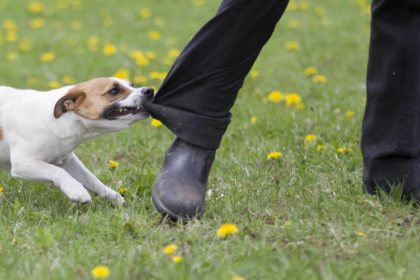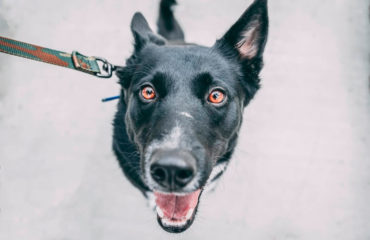How to Stop your Dog from Biting

All dogs have the potential to bite, even if they haven’t shown aggressive behaviour before. It’s the pet owners responsibility to mitigate this behaviour with training.
Recent research revealed that there had been a huge rise in online users searching for ‘dog bite’, ‘dog bite lawyer’, and ‘dog attack’ since the pandemic puppy boom. These findings suggest more people are seeking advice on rectifying their dog’s aggressive behaviour or what to do after a dog attack.
If your dog bites someone, not only could they cause serious harm to the victim, but the dog could be reported, and you might face legal ramifications.
In this guide, Benchmark Kennels have collated advice for preventing this behavioural problem from developing, identifying the signs your dog is about to bite, and what to do if it occurs.

What can cause dogs to bite?
Biting is often a natural instinctive response to threatening situations, such as if a dog is startled, attacked by another dog or exposed to loud noise.
Other possible causes for dogs biting can include:
- Protecting their territory if someone disrupts their toys, food, or puppies
- Becoming overly excited when playing
- Being bothered while in pain from an illness or injury
- Not being spayed or neutered
A lack of training can cause dogs to feel anxious or scared in social situations, which can cause them to react aggressively.
If aggressive behaviour occurs suddenly, seek advice from a veterinarian in case there is a medical cause.
How to tell if your dog is about to bite
Recognising your dog’s body language and how it changes based on how their feeling, will help you defuse a situation if they become aggressive.
Here are some warning signs to look out for that your dog is about to bite:
- Baring teeth
- Raised hackles
- Growling
- Rigid and quick tail wagging
- A stiffened body posture
If your dog becomes aggressive when you’re alone, stay calm, don’t make any sudden movements and slowly back away. Don’t look them in the eye, smile at them, or show your back to them either.
If you’re in a public place and there is a risk your dog could bite another animal or person, approach them very carefully and remove them from the situation.
Aggression in dogs often stems from fear or anxiety, so it’s helpful to identify the body language for these emotions too, such as:
- Cowering
- Avoiding eye contact
- Lowering their body
- Hanging their head low
- Pointing their ears back
If your dog expresses signs of distress, calmly and confidently move them to a more comforting environment.
Training methods to prevent dog bites
The best way to prevent a dog from biting in the future is through training them as a puppy as soon as you bring them home, which is usually at eight weeks old.
Socialisation
Dogs should typically be socialised from four to 12 weeks old when their brains are more flexible and receptive. This technique will help them feel comfortable around new people, other dogs, and in new situations without becoming frightened.
Obedience training
If your dog is obedient, you’re more likely to have control over a challenging situation that may make them stressed, scared, or angry. By using basic commands, you can keep your dog out of trouble.
Positive reinforcement
Punishing your dog for bad behaviour is likely to encourage aggression, mistrust, and anxiety. Instead, reward your dog for good behaviour with treats, verbal praise, petting, or playtime and strengthen your bond in the process.
Working with a professional dog behaviourist is a great way to implement these training techniques and minimise bad habits from forming. It’s especially beneficial to work with a trainer if you’re looking to retrain and remedy poor behaviour.

What to do if your dog does bite
If your dog bites you, don’t pull away, as this can increase their aggression. Try putting an object between you and the dog that they can latch onto instead. Avoid making loud noises and don’t hit them, as this will just aggravate the dog further.
Confine the dog to their crate, kennel or another room. Then, clean the wound with soap and warm water. If the bite is deep, painful, inflamed, or discoloured, seek medical attention.
If your dog has bitten somebody else, help the victim as soon as you have safely removed the dog from the situation. Depending on the severity of the bite, you may need to call for an ambulance.
Once the wound has been seen to, exchange contact details with the injured person, as it’ll help your case if you’re cooperative. If your dog was provoked, get the contact details of witnesses as well to support your defence.
Your dog’s behaviour will be held to a higher standard in the future. So, you’ll need to put precautions in place to prevent your dog from biting again.
Keep your dog on a leash until you’re confident they’re comfortable around unfamiliar people and dogs, will listen to commands, and aren’t likely to become aggressive. However, always keep dogs on a lead on private land, where there’s livestock, and in areas with signs stipulating the requirement.
Does your dog need a place to retreat to when stressed?
Benchmark Kennels provide a range of outdoor kennels that your dog can use as a den and retreat to when they feel overwhelmed by guests, loud noises, or other animals. Providing your dog with a ‘safe space’ where they can have uninterrupted alone time is especially beneficial if they struggle with anxiety.
The secure and insulated kennels can be customised to suit your dog’s shape, size, and breed, to maximise their comfort.
For more information on our range of kennels, contact a member of our friendly team via phone. If you have everything you need, order a wooden or WPC eco-thermal kennel from our website today.
10 Comments to “ How to Stop your Dog from Biting”
You must be logged in to post a comment.





… [Trackback]
[…] There you can find 88351 additional Info to that Topic: benchmarkkennels.co.uk/how-to-stop-your-dog-from-biting […]
… [Trackback]
[…] Info to that Topic: benchmarkkennels.co.uk/how-to-stop-your-dog-from-biting […]
… [Trackback]
[…] Find More Information here on that Topic: benchmarkkennels.co.uk/how-to-stop-your-dog-from-biting […]
… [Trackback]
[…] Information to that Topic: benchmarkkennels.co.uk/how-to-stop-your-dog-from-biting […]
… [Trackback]
[…] There you can find 88156 additional Info to that Topic: benchmarkkennels.co.uk/how-to-stop-your-dog-from-biting […]
… [Trackback]
[…] Find More on that Topic: benchmarkkennels.co.uk/how-to-stop-your-dog-from-biting […]
… [Trackback]
[…] Find More Info here on that Topic: benchmarkkennels.co.uk/how-to-stop-your-dog-from-biting […]
… [Trackback]
[…] Here you will find 92868 additional Info on that Topic: benchmarkkennels.co.uk/how-to-stop-your-dog-from-biting […]
… [Trackback]
[…] There you will find 55414 additional Info to that Topic: benchmarkkennels.co.uk/how-to-stop-your-dog-from-biting […]
… [Trackback]
[…] Read More to that Topic: benchmarkkennels.co.uk/how-to-stop-your-dog-from-biting […]